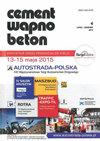Application of digital image analysis as a method of assessing the of carbonation process of cement binders – impact of distortion on the results of real and model samples
IF 0.6
4区 工程技术
Q4 CONSTRUCTION & BUILDING TECHNOLOGY
引用次数: 0
Abstract
Nowadays, because of the use of active additives in cement, studies on carbonation progress are crucial to ensure the safety of structures. Carbonation depth measurement involves the use of a calliper to determine the front of the carbonation. The values determined in this way are averaged, and the corrosion progress is estimated based on these values. Due to the fact that the standard approach assumes the use of a discrete method for determining the carbonation depth, the measurement may be subject to error, and its execution, especially for many samples, is time-consuming. An alternative method for determining the depth of carbonation may be continuous measurement, which determines the actual depth of carbonation since the entire sample area is analysed. Therefore, digital image analysis is the more precise and convenient approach. Unfortunately, it is not an approach, covered by the standards, but may help to assess the correctness of the determination, the carbonation depth. The problem with the use of digital analysis in proposed method may be the quality of the image obtained. The main problem may be the sphericity of the image, related to the nature of the camera, but also the lack of perpendicularity of the optical system of the camera to the sample when fixing its image, related to incorrect positioning by the camera operator. The results show that the digital image analysis is more accurate than the traditional approach, and that the distortion caused by the tilt of the image does not affect the obtained values to a greater degree than the measurement accuracy of the traditional approach.数字图像分析在水泥粘结剂碳化过程评价中的应用——变形对实际样品和模型样品结果的影响
目前,由于活性添加剂在水泥中的应用,研究水泥的碳化进展对保证结构的安全至关重要。碳化深度测量包括使用卡尺来确定前方的碳化。用这种方法得到的值取平均值,并根据这些值估计腐蚀过程。由于标准方法假设使用离散方法来确定碳酸化深度,因此测量可能会出现误差,并且其执行,特别是对于许多样品,是耗时的。确定碳酸化深度的另一种方法可能是连续测量,因为分析了整个样品区域,因此可以确定碳酸化的实际深度。因此,数字图像分析是比较精确和方便的方法。不幸的是,它不是标准所涵盖的一种方法,但可能有助于评估测定碳酸化深度的正确性。该方法中使用数字分析的问题可能是所获得的图像质量。主要的问题可能是图像的球形,这与相机的性质有关,但也可能是相机的光学系统在固定图像时与样品缺乏垂直度,这与相机操作员的错误定位有关。结果表明,与传统方法相比,数字图像分析的精度更高,并且由于图像倾斜引起的畸变对所得值的影响程度小于传统方法的测量精度。
本文章由计算机程序翻译,如有差异,请以英文原文为准。
求助全文
约1分钟内获得全文
求助全文
来源期刊

Cement Wapno Beton
CONSTRUCTION & BUILDING TECHNOLOGY-MATERIALS SCIENCE, COMPOSITES
CiteScore
1.30
自引率
28.60%
发文量
0
审稿时长
>12 weeks
期刊介绍:
The Publisher of the scientific bimonthly of international circulation, entitled "Cement-Wapno-Beton" ["Cement-Lime-Concrete"], is the Fundacja Cement, Wapno, Beton [Foundation Cement, Lime, Concrete]. The periodical is dedicated to the issues concerning mineral setting materials and concrete. It is concerned with the publication of academic and research works from the field of chemistry and technology of building setting materials and concrete
 求助内容:
求助内容: 应助结果提醒方式:
应助结果提醒方式:


